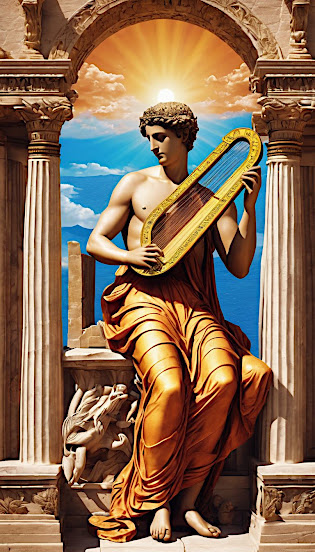Thracian Demigod of Music, Lost Love, Underworld Journeys, and Fate
Tenets of Orpheus
- Harmonize the world with music
- Seek one's lost love
- Traveling to the underworld if need be
- Don't look back
- Special: Being a demigod, Orpheus is usually only served by lyrists (see Part II) and mystics.
- Allowed Weapons: staff, club, dagger
- Allowed Armor: none
- Symbol: Lyre
- Can Turn: None.
- Mysteries of Orpheus: Lyrists of Orpheus can gain or grant a +3 modifier to a roll to bring peace, resolution, or restoration to one who hears their music. They may do so up to once per day per level.
Magical Side-Effects of Orpheus
Die to what is. Only then can the music be truly heard.
1. Eurydice Lament: Love's end is guaranteed neverending. The magic must be used in response to loss or sorrow. If not, then it only has a 50% chance of working. If that is the case, it is followed by an additional 25% chance of triggering a divine test or having the spell be lost too (an equal chance of either). The dirge is sung.
2. Gaze Forward: Without trust in the divine, all will come to naught. Otherwise, a world of emptiness is all that awaits. The lyrist must not look at the spell's target for at least the next 3d6 rounds afterwards, otherwise his magic will be reversed. What is more, there's a 25% chance of him also triggering a divine test if this happens.
3. Maenad Doom: Such beauty will not be ignored. The lyrist must have allowed at least some Dionysian wildness and flesh into his life over the past 1d6 days. If not, then he must save vs. death/ make a Will save DC 10 or take 1d4 damage from such women tearing him apart to make sure that he does.
4. Euphonious: All within 120' gain a +1 bonus to their next roll related to music, love, traveling the underworld, or accepting one's fate.
5-8. Standard Spell: The magic occurs without side-effect this time.
9. Return to the Light: One can't go back, at least not without many trials. If the lyrist decides to not cast the spell again for the next 1d6 days, then its effect, range, or duration can be raised 50%. If not, then the opposite occurs, encouraging acceptance in either case.
10-11. Melody Ascendant: Such harmonies can move one higher. If the lyrist plays his lyre well (a Charisma check), then the magic's effect, range, or duration can be improved by 50%, doubled if done so especially well (per Referee) or if the lyrist's player even sings too.
12. Blessing of Orpheus: What one seeks, one will never find. The magic's effect, range, or duration can be improved x2 and it can be cast again that day. In addition, if it is intended to help its recipient, they then gain a +3 bonus to saves when not seeking (in any direction) or when not gazing behind for the next 1d6 turns.
Next week: divine tests, folk variations, and a specialized class of Orpheus in Part II!

